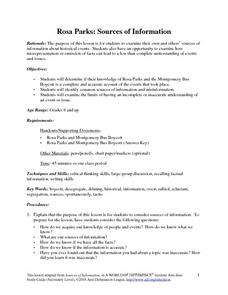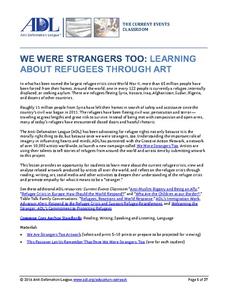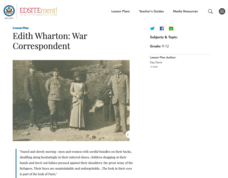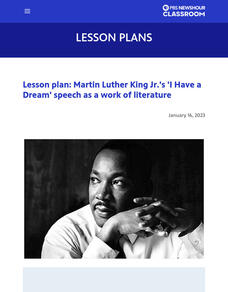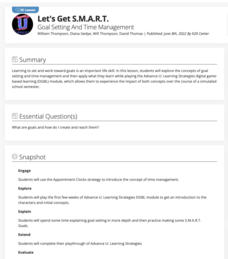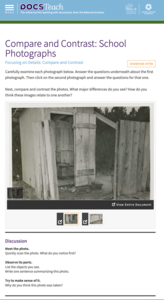C3 Teachers
Civil Rights: What Made Nonviolent Protest Effective during the Civil Rights Movement?
Sit-ins and boycotts, marches and speeches, songs and demonstrations were hallmarks of nonviolent protest of the civil rights movement. Young scholars research primary and secondary source documents to determine what made nonviolent...
C3 Teachers
African Americans and the Civil War: How Did African Americans Experience the Civil War?
To understand African Americans' involvement in the United States Civil War, high schoolers gather evidence from primary source images, census reports, and documents. As a summative performance task, individuals craft an argument,...
C3 Teachers
Anna - One Woman’s Quest for Freedom: What Did Freedom Mean for Anna?
The 2018 film Anna, One Woman's Quest for Freedom in Early Washington, D.C., offers high schoolers an opportunity to examine the sacrifices one woman endured to gain her freedom from slavery.
Anti-Defamation League
Rosa Parks: Sources of Information
Young scholars show what they know about Rosa Parks and the incident on one of the buses in Montgomery, Alabama. Groups discuss and identify where they receive most of their information. They examine the importance of having a complete...
Anti-Defamation League
We Were Strangers Too: Learning About Refugees Through Art
Did you know that "in the largest refugee crisis since World War II, more the 64 million people have been forced from their homes"? The Anti-Defamation League presents an activity that asks class members to examine a series of artworks...
Anti-Defamation League
Social Justice Poetry
Learners gain insight into how songs and poems express feelings of injustice. They also learn about literary devices and types of poems and make a personal connection when they write their own free verse poems about injustice.
Anti-Defamation League
7 Ideas for Teaching Women's History Month
Celebrate Women's History Month with hands on-learning. The resource provides seven strategies to help educators teach Women's History Month, ranging from watching films to reading books written by women. Activities including writing...
National Endowment for the Humanities
Edith Wharton: War Correspondent
High schoolers research how the field of war correspondence has evolved. Young historians read chapter's from Edith Wharton's book Fighting France, From Dunkerque to Belfort. Students investigate an American correspondents' experiences...
National Endowment for the Humanities
Women's Suffrage: Why the West First?
Eleventh graders discuss the granting of voting rights to women in several Western states. They take a stand, supported by historical evidence, as to whether or not a single theory explains why Western states were the first to grant full...
University of Minnesota
Neuropathfinding: Kinesthetic Model
Playing follow the leader has never been so interesting! Get the class up and moving while they take on the roles of nervous system components. Through trial and error, they learn the importance of the "pioneer" growth cone that leads...
C3 Teachers
Emancipation: Does It Matter Who Freed the Slaves?
Scholars generally agree on the emancipation of enslaved people in the United States. This inquiry-based lesson asks high schoolers to consider more than the claims of who freed the enslaved people but the significance of the issues...
Learning for Justice
The Color of Law: Creating Racially Segregated Communities
It is pointed, powerful, and painful! The first of three lessons about laws and practices that support inequality looks at how government policies created and reinforced segregated communities. Young social scientists read excerpts from...
Learning for Justice
The Color of Law: Winners and Losers in the Job Market
The second lesson in "The Color of Law" shows how government policies supported economic inequality. Scholars read additional excerpts and respond to text-dependent questions from "The Color of Law" text, examine primary source documents...
Learning for Justice
The Color of Law: Developing the White Middle Class
The final lesson plan in the "Color of Law" series explores the government's discriminatory economic policies. Young scholars watch videos, read primary source materials, and examine images to gather information. They discuss how what...
PBS
Amid Rising Economic Inequality, Does America Need a Third Reconstruction?
Young political scientists investigate the Poor People's Campaign protest held in Washington, D.C., on June 18, 2022. They research how the event was reported in various news outlets and consider their stance on whether "poverty is...
PBS
History of Juneteenth and Why It’s Now a National Holiday
June 19 is now a United States federal holiday. Young historians examine the background of the first Juneteenth celebrations and why on June 15, 2021, Congress finally approved "Juneteenth National Independence Day" as a federal holiday.
PBS
Dr. Martin Luther King Jr.’s ‘I Have a Dream’ Speech as a Work of Literature
To appreciate the oratory of Dr. Martin Luther King Jr.'s "I Have a Dream" speech, scholars examine the rhetorical devices and influences that make the speech so famous. They examine background information, conduct a close reading of the...
PBS
Dr. Martin Luther King Jr.’s ‘I Have a Dream’ Speech as Visual Text
Young historians watch a video of Dr. Martin Luther King Jr. delivering his "I Have a Dream" speech and answer questions that test their knowledge of the event. After discussing the fact sheet, they reread the speech, select a phrase or...
K20 LEARN
Let's Get S.M.A.R.T. - Goal Setting And Time Management
Advance U: Learning Strategies provides young scholars with a game that teaches them the importance of goal setting and time management. Players enroll in McLarin Academy and compete in three competitions requiring them to set Specific,...
K20 LEARN
Deconstructing Reconstruction: The Reconstruction Era
High schoolers examine the Reconstruction programs instituted following the American Civil War, the potential for change these efforts offered, and the realities that occurred. Guided by a PowerPoint presentation, class members read a...
DocsTeach
Compare and Contrast: School Photographs
Separate and very unequal! An interactive presents learners with two images: a photograph of a boys' bathroom at a school in Gloucester County, Virginia, and a second of a girls' bathroom at a different school in the same county. The...
DocsTeach
African American Soldiers and Civil Rights During WWI
Young scholars analyze primary source documents and images to determine how African American soldiers were denied their civil rights during World War I.
Curated OER
Mirror Image
Why does practice make perfect? Give your class insight into procedural memory, where we learn to do new things — then continue to improve through repetition. By attempting to draw shapes while looking in a mirror, learners observe their...
K20 LEARN
Voices from the Past: History and Literature
Art can enhance the understanding of history. That's the big idea in a lesson that has young scholars read Randall Jarrell's poem "The Death of the Ball Turret Gunner" and an excerpt from John Hersey's Hiroshima, which provide a...





